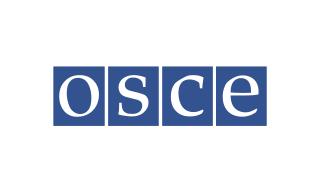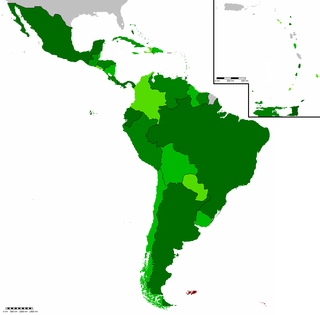Politics in Georgia involve a parliamentary representative democratic republic with a multi-party system. The President of Georgia is the ceremonial head of state and the Prime Minister of Georgia is the head of government. The Prime Minister and the Government wield executive power. Legislative power is vested in both the Government and the unicameral Parliament of Georgia.

The Organization for Security and Co-operation in Europe (OSCE) is a regional security-oriented intergovernmental organization comprising member states in Europe, North America, and Asia. Its mandate includes issues such as arms control, the promotion of human rights, freedom of the press, and free and fair elections. It employs around 3,460 people, mostly in its field operations but also in its secretariat in Vienna, Austria, and its institutions. It has observer status at the United Nations.

The president of Georgia is the ceremonial head of state of Georgia as well as the commander-in-chief of the Defence Forces. The constitution defines the presidential office as "the guarantor of the country's unity and national independence."

The International Republican Institute (IRI) is an American nonprofit organization founded in 1983 and funded and supported by the United States federal government. Most of its board is drawn from the Republican Party. Its public mission is to advance freedom and democracy worldwide by helping political parties to become more issue-based and responsive, assisting citizens to participate in government planning, and working to increase the role of marginalized groups in the political process, including women and youth. It has been repeatedly accused of foreign interference and has been implicated in the 2004 Haitian coup d'état. It was initially known as the National Republican Institute for International Affairs.
The International Foundation for Electoral Systems (IFES) is an international, non-profit organisation founded in 1987. Based in Arlington, Virginia, United States, the organization assists and supports elections and electoral stakeholders. Since 1987, IFES has worked in 145 countries and has programs in more than 50 countries throughout Asia-Pacific, Africa, Eurasia, the Middle East, and North Africa, and the Americas.

Election monitoring involves the observation of an election by one or more independent parties, typically from another country or from a non-governmental organization (NGO). The monitoring parties aim primarily to assess the conduct of an election process on the basis of national legislation and of international election standards. There are national and international election observers.

Freedom in the World is a yearly survey and report by the U.S.-based non-governmental organization Freedom House that measures the degree of civil liberties and political rights in every nation and significant related and disputed territories around the world.

Ana Dolidze is a Georgian attorney, professor of international law and government official, founder and chairman of the "For the People" party. A speaker and writer on international law and human rights in Caucasus and Central Eurasia, she was appointed as the chief legal adviser to the President of Georgia on 27 June 2016. On 8 January 2018 the President of Georgia appointed Dolidze to the High Council of Justice, the body that oversees the judiciary.

Liberal democracy, western-style democracy, or substantive democracy is a form of government that combines the organization of a democracy with ideas of liberal political philosophy.

The Community of Latin American and Caribbean States (CELAC) is a bloc of Latin American and Caribbean states, consisting of 33 countries, and has five official working languages. It is seen as an alternative to the Organization of American States (OAS), and includes all OAS member states plus includes the nation of Cuba. Initially proposed on February 23, 2010, at the Rio Group–Caribbean Community Unity Summit, CELAC is seen as the successor of the Rio Group and the Latin American and Caribbean Summit on Integration and Development (CALC). CELAC was created to deepen Latin American integration and to reduce hegemony within the politics and economics of the region. The date of creation was on December 3, 2011, in Caracas, Venezuela, with the signing of the Declaration of Caracas.
A hybrid regime is a type of political system often created as a result of an incomplete democratic transition from an authoritarian regime to a democratic one. Hybrid regimes are categorized as having a combination of autocratic features with democratic ones and can simultaneously hold political repressions and regular elections. Hybrid regimes are commonly found in developing countries with abundant natural resources such as petro-states. Although these regimes experience civil unrest, they may be relatively stable and tenacious for decades at a time. There has been a rise in hybrid regimes since the end of the Cold War.

Georgian Dream – Democratic Georgia (GD), also colloquially known as the Kotsebi, is a populist political party in Georgia. It is currently the ruling party in Georgia. Irakli Garibashvili serves as the party chairman, while the former chairman Irakli Kobakhidze has served as the prime minister since February 2024. Bidzina Ivanishvili, widely considered the de facto leader of the party, serves as its honorary chairman. The party's electoral number is 41.
Access to public information and freedom of information (FOI) refer to the right to access information held by public bodies also known as "right to know". Access to public information is considered of fundamental importance for the effective functioning of democratic systems, as it enhances governments' and public officials' accountability, boosting people participation and allowing their informed participation into public life. The fundamental premise of the right to access public information is that the information held by governmental institutions is in principle public and may be concealed only on the basis of legitimate reasons which should be detailed in the law.

Europe-Georgia Institute (EGI) – is a non-governmental organization and a pro-European think tank in Georgia. The Europe-Georgia Institute was founded by George Melashvili, Shalva Chkheidze and Revaz Topuria in 2015.

Parliamentary elections were held in Georgia on 26 October 2024. The elections were held under the rules passed in 2017 through the constitutional amendments which shifted the electoral system towards a fully proportional representation with a 5% electoral threshold. The ruling Georgian Dream (GD) party sought to win its fourth term in office. Its founder, Bidzina Ivanishvili—an influential oligarch and former prime minister often regarded as the country's éminence grise following his official departure from politics in 2021—returned to politics several months before the polls to lead GD in the elections.

Democratic backsliding, also known as autocratization, is the decline in democratic qualities of a political regime, the opposite of democratization.
Nodar Natadze was a Georgian literary critic, linguist, and politician, best known as the continuous leader of Popular Front – one of the oldest political groups founded in the last years of Soviet Georgia – since its inception in 1989.
The Colombian Electoral Observation Mission or MOE is a Colombian network of civil society organisations involved in the training of citizens for election monitoring since 2006 and in running a crowdsourcing election monitoring website, "Pilas con el Voto", since 2011. It also cooperates in research projects studying election monitoring.
International Society for Fair Elections and Democracy or ISFED is a Georgian election monitoring and democracy promoting non-governmental organization created in 1995.












